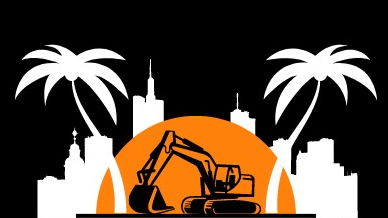I have never looked at your old house and thought, “Where do I start?” The walls have stories, and the roof might leak. And now it’s time to knock it all down.
Demolishing a home isn’t just about bringing in the machines. It’s about knowing what to do before they arrive. Miss a step, and you’re stuck with delays, unexpected costs, or a mountain of stress.
But here’s the good news: With the right plan, the process is smoother than you think. This guide breaks it down with no fluff, guesswork, or the real steps that matter. You can also explore our Complete Guide to Residential Demolition in Florida to understand the process, costs, and requirements in depth.
How to Prepare Your Home for Demolition
Get your home demolition-ready with confidence. From permits to clean-up, here’s how to prep your property step by step without stress or surprises.
1. Start with Permits: Do Not Skip This
Before a single wall comes down, you need approval. In Florida, residential demolition requires proper permitting from your local municipality. Each city or county has its guidelines. Some may ask for site plans or neighbor notifications. Others will want you to verify utility disconnections or environmental clearances. Check out the complete guide on permits for residential demolition in Florida.
Here’s the smart move: Work with a contractor who knows this system inside and out. Florida Demolition Experts manages all the paperwork for you, which means faster approvals and fewer headaches.
2. Disconnect All Utilities
This step is mission-critical. Before demolition begins, you must schedule the disconnection of gas, electricity, water, and sewer lines. Most utility companies require formal notice and may take several business days to complete the work.
Never assume your contractor or city inspector has handled this. Contact your providers directly or confirm your contractor has scheduled it. You may also need written proof of disconnection to get final demolition approval.
3. Salvage Before You Scrap
Demolition does not mean the destruction of everything. If your kitchen has usable cabinets or your home features original hardwood, you can salvage them. Windows, doors, lighting fixtures, even bricks and pavers may be worth saving or donating.
Many homeowners offset some demo costs by reselling materials or donating to organizations like Habitat for Humanity. Others choose to repurpose salvaged items in their next build.
If you work with Florida Demolition Experts, our team helps identify salvageable materials, coordinate removals, and responsibly minimize waste.
4. Clear the Property Completely
This is your responsibility as a homeowner. Remove all personal belongings, furniture, decor, stored items, and debris. Check garages, attics, basements, crawlspaces, closets, sheds, and backyard structures.
Anything left behind is likely to be destroyed.
And once the equipment starts, there’s no pause button. If needed, walk through the property twice. Label anything that must stay for removal later, like salvageable beams or stone. Remove everything else.
5. Notify Your Neighbors
This is just common courtesy; in some places, it’s required by law. Let your neighbors know about your demolition timeline and what to expect.
Noise, dust, and vibration can affect nearby homes. Early notice allows residents to make arrangements, move pets, protect vehicles, or brace for the noise. A friendly heads-up helps avoid complaints and builds goodwill in the community.
6. Fence the Site and Add Signage
Once the demo zone is active, it becomes a construction site. Safety is the top priority. The property must be secured with temporary fencing to keep people and animals away.
Proper Signage should be posted around the perimeter. This includes contractor information, required permit displays, safety notices, and emergency contact numbers.
Florida Demolition Experts handles all of this for you, from fencing to Signage to site safety planning so that you can stay focused on your next steps.
7. Prepare for Surprises
Let’s be real. No demolition job goes exactly as planned. You might discover an underground oil tank, rotted foundation, unmarked utilities, or hazardous materials like asbestos or lead. If you’re unprepared, these things can stall work or increase costs.
The difference between a disaster and a manageable hiccup is who you hire. With over a decade of experience, Florida Demolition Experts knows what to look for and how to handle it fast, clean, and by the book.
8. Have a Post-Demo Plan
Once your home is down, you’re left with rubble. Do you know what happens next? Site cleanup is essential. Most counties require complete debris removal within a set number of days. You’ll also need to level the land, remove leftover foundations, and possibly backfill the site depending on what’s next.
If you plan to rebuild, you must coordinate this with your builder. The cleanup affects resale value and inspections if you’re selling or holding the lot.
Our crew ensures your site is clean, safe, and ready for whatever comes next, a new foundation or a fresh listing on the market.
FAQ’s about How to Prepare Your Home for Demolition
1. How long does preparing a home for demolition in Florida take?
Most homes can be prepped in 7 to 14 days. This includes permit approval, utility disconnection, salvaging materials, and site clearing. Delays may happen if hazardous materials or permit backlogs exist.
2. Can I stay in my home while preparing for demolition?
No. The home is no longer safe once utilities are disconnected and salvage operations begin. You should plan to relocate before demolition prep starts.
3. What happens if asbestos is found during the prep phase?
If asbestos is discovered, all work must stop until a certified abatement team removes it. Florida has strict laws about asbestos handling. Your demolition contractor should guide you through this process safely and legally.
4. Who is responsible for removing old foundations or underground tanks?
The demolition contractor usually includes foundation and tank removal in the project scope. Always confirm this before signing a contract. At Florida Demolition Experts, we offer complete teardown and site-clearing services.
5. Do I need a demolition permit to rebuild the same lot?
Yes. A demolition permit is required even if you’re tearing down to rebuild. You may also need separate permits for new construction. Getting ahead of this ensures your build timeline stays on track.
Final Thoughts
Demolition might feel overwhelming, but it doesn’t have to be. The more you prepare, the smoother it goes. And you don’t need to do it all alone. That’s why we’re here to help with Florida demolition experts.
We’ve handled hundreds of residential demolitions across the state. We take care of everything: permits, utility disconnection, salvaging, safety, and cleanup. You’ll never be left guessing, waiting, or cleaning up a mess someone else caused.
Visit FloridaDemolitionExperts.com to book your free consultation. Let’s make your demolition smart, safe, and stress-free, exactly how it should be.






